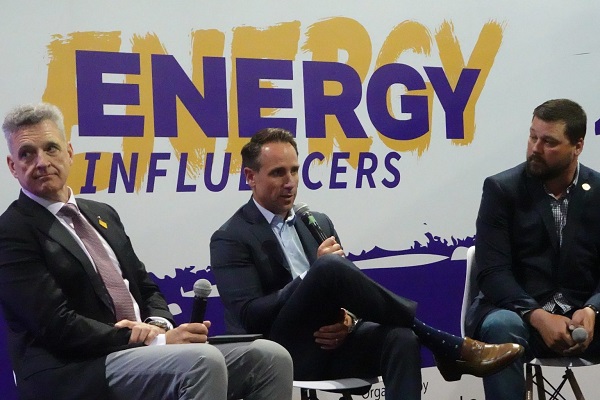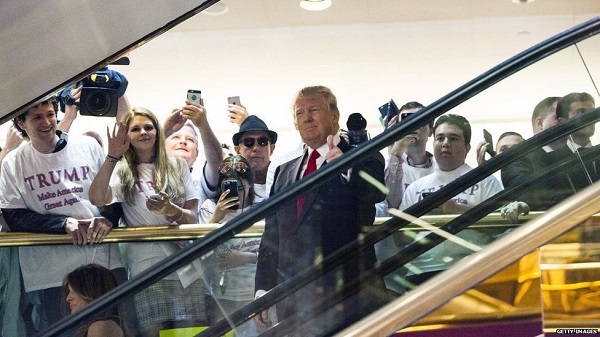Uncategorized
Sen. Bernie Sanders says he’s running for president in 2020

WASHINGTON — Vermont Sen. Bernie Sanders, whose insurgent 2016 presidential campaign reshaped Democratic politics, announced Tuesday that he is running for president in 2020.
“Our campaign is not only about defeating Donald Trump,” the 77-year-old self-described democratic socialist said in an email to supporters. “Our campaign is about transforming our country and creating a government based on the principles of economic, social, racial and environmental justice.”
An enthusiastic progressive who embraces proposals ranging from Medicare for All to free college tuition, Sanders stunned the Democratic establishment in 2016 with his spirited challenge to Hillary Clinton. While she ultimately became the party’s nominee, his campaign helped lay the groundwork for the leftward lurch that has dominated Democratic politics in the Trump era.
The question now for Sanders is whether he can stand out in a crowded field of Democratic presidential candidates who also embrace many of his policy ideas and are newer to the national political stage. That’s far different from 2016, when he was Clinton’s lone progressive adversary.
Still, there is no question that Sanders will be a formidable contender for the Democratic nomination. He won more than 13 million votes in 2016 and dozens of primaries and caucuses. He opens his campaign with a nationwide organization and a proven small-dollar fundraising effort.
“We’re gonna win,” Sanders told CBS.
He said he was going to launch “what I think is unprecedented in modern American history”: a grassroots movement “to lay the groundwork for transforming the economic and political life of this country.”
Sanders described his new White House bid as a “continuation of what we did in 2016,” noting that policies he advocated for then are now embraced by the Democratic Party.
“You know what’s happened in over three years?” he said. “All of these ideas and many more are now part of the political mainstream.”
Sanders could be well positioned to compete in the nation’s first primary in
Sen. Kamala Harris of California, another Democratic presidential contender, was in New Hampshire on Monday and said she’d compete for the state. She also appeared to take a dig at Sanders.
“The people of New Hampshire will tell me what’s required to compete in New Hampshire,” she told shoppers at a bookstore in Concord. “But I will tell you I’m not a democratic socialist.”
Sen. Elizabeth Warren of nearby Massachusetts will be in New Hampshire on Friday.
One of the biggest questions surrounding Sanders’ candidacy is how he’ll compete against someone like Warren, who shares many of his policy goals. Warren has already launched her campaign and has planned an aggressive swing through the early primary states.
Shortly after announcing her exploratory committee, Warren hired Brendan Summers, who managed Sanders’ 2016 Iowa campaign. Other staffers from Sanders’ first bid also have said they would consider working for other candidates in 2020.
The crowded field includes a number of other candidates who will likely make strong appeals to the Democratic base including Harris and Sens. Cory Booker of New Jersey, Amy Klobuchar of Minnesota and Kirsten Gillibrand of New York. The field could also grow, with a number of high-profile Democrats still considering presidential bids, including former
While Sanders had been working to lay the groundwork for a second campaign for months, it was unclear whether he will be able to expand his appeal beyond his largely white base of supporters. In 2016, Sanders notably struggled to garner support from black voters, an issue that could become particularly pervasive during a primary race that could include several non-white candidates.
Last month, he joined Booker at an event in Columbia, South Carolina, marking the Martin Luther King Jr. holiday. In 2016, Sanders lost the South Carolina primary, which features a heavily black electorate, by 47 points.
Sanders also faces different pressures in the #MeToo era. Some of his male staffers and supporters in 2016 were described as “Bernie bros” for their treatment of women.
In the run-up to Sanders’ 2020 announcement, persistent allegations emerged of sexual harassment of women by male staffers during his 2016 campaign. Politico and The New York Times reported several allegations of unwanted sexual advances and pay inequity.
In an interview with CNN after the initial allegations surfaced, Sanders apologized but also noted he was “a little busy running around the country trying to make the case.”
As additional allegations emerged, he offered a more unequivocal apology.
“What they experienced was absolutely unacceptable and certainly not what a progressive campaign — or any campaign — should be about,” Sanders said Jan. 10 on Capitol Hill. “Every woman in this country who goes to work today or tomorrow has the right to make sure that she is working in an environment which is free of harassment, which is safe and is comfortable, and I will do my best to make that happen.”
Juana Summers, The Associated Press
Uncategorized
Kananaskis G7 meeting the right setting for U.S. and Canada to reassert energy ties


Energy security, resilience and affordability have long been protected by a continentally integrated energy sector.
The G7 summit in Kananaskis, Alberta, offers a key platform to reassert how North American energy cooperation has made the U.S. and Canada stronger, according to a joint statement from The Heritage Foundation, the foremost American conservative think tank, and MEI, a pan-Canadian research and educational policy organization.
“Energy cooperation between Canada, Mexico and the United States is vital for the Western World’s energy security,” says Diana Furchtgott-Roth, director of the Center for Energy, Climate and Environment and the Herbert and Joyce Morgan Fellow at the Heritage Foundation, and one of America’s most prominent energy experts. “Both President Trump and Prime Minister Carney share energy as a key priority for their respective administrations.
She added, “The G7 should embrace energy abundance by cooperating and committing to a rapid expansion of energy infrastructure. Members should commit to streamlined permitting, including a one-stop shop permitting and environmental review process, to unleash the capital investment necessary to make energy abundance a reality.”
North America’s energy industry is continentally integrated, benefitting from a blend of U.S. light crude oil and Mexican and Canadian heavy crude oil that keeps the continent’s refineries running smoothly.
Each day, Canada exports 2.8 million barrels of oil to the United States.
These get refined into gasoline, diesel and other higher value-added products that furnish the U.S. market with reliable and affordable energy, as well as exported to other countries, including some 780,000 barrels per day of finished products that get exported to Canada and 1.08 million barrels per day to Mexico.
A similar situation occurs with natural gas, where Canada ships 8.7 billion cubic feet of natural gas per day to the United States through a continental network of pipelines.
This gets consumed by U.S. households, as well as transformed into liquefied natural gas products, of which the United States exports 11.5 billion cubic feet per day, mostly from ports in Louisiana, Texas and Maryland.
“The abundance and complementarity of Canada and the United States’ energy resources have made both nations more prosperous and more secure in their supply,” says Daniel Dufort, president and CEO of the MEI. “Both countries stand to reduce dependence on Chinese and Russian energy by expanding their pipeline networks – the United States to the East and Canada to the West – to supply their European and Asian allies in an increasingly turbulent world.”
Under this scenario, Europe would buy more high-value light oil from the U.S., whose domestic needs would be back-stopped by lower-priced heavy oil imports from Canada, whereas Asia would consume more LNG from Canada, diminishing China and Russia’s economic and strategic leverage over it.
* * *
The MEI is an independent public policy think tank with offices in Montreal, Ottawa, and Calgary. Through its publications, media appearances, and advisory services to policymakers, the MEI stimulates public policy debate and reforms based on sound economics and entrepreneurship.
As the nation’s largest, most broadly supported conservative research and educational institution, The Heritage Foundation has been leading the American conservative movement since our founding in 1973. The Heritage Foundation reaches more than 10 million members, advocates, and concerned Americans every day with information on critical issues facing America.
Uncategorized
Poilievre on 2025 Election Interference – Carney sill hasn’t fired Liberal MP in Chinese election interference scandal

From Conservative Party Communications
“Yes. He must be disqualified. I find it incredible that Mark Carney would allow someone to run for his party that called for a Canadian citizen to be handed over to a foreign government on a bounty, a foreign government that would almost certainly execute that Canadian citizen.
“Think about that for a second. We have a Liberal MP saying that a Canadian citizen should be handed over to a foreign dictatorship to get a bounty so that that citizen could be murdered. And Mark Carney says he should stay on as a candidate. What does that say about whether Mark Carney would protect Canadians?
“Mark Carney is deeply conflicted. Just in November, he went to Beijing and secured a quarter-billion-dollar loan for his company from a state-owned Chinese bank. He’s deeply compromised, and he will never stand up for Canada against any foreign regime. It is another reason why Mr. Carney must show us all his assets, all the money he owes, all the money that his companies owe to foreign hostile regimes. And this story might not be entirely the story of the bounty, and a Liberal MP calling for a Canadian to be handed over for execution to a foreign government might not be something that the everyday Canadian can relate to because it’s so outrageous. But I ask you this, if Mark Carney would allow his Liberal MP to make a comment like this, when would he ever protect Canada or Canadians against foreign hostility?
“He has never put Canada first, and that’s why we cannot have a fourth Liberal term. After the Lost Liberal Decade, our country is a playground for foreign interference. Our economy is weaker than ever before. Our people more divided. We need a change to put Canada first with a new government that will stand up for the security and economy of our citizens and take back control of our destiny. Let’s bring it home.”
-

 espionage1 day ago
espionage1 day agoFrom Sidewinder to P.E.I.: Are Canada’s Political Elites Benefiting from Beijing’s Real Estate Reach?
-

 Business1 day ago
Business1 day agoSenator wants to torpedo Canada’s oil and gas industry
-

 Alberta2 days ago
Alberta2 days agoAlberta’s carbon diet – how to lose megatonnes in just three short decades
-

 Energy1 day ago
Energy1 day agoWho put the energy illiterate in charge?
-

 espionage1 day ago
espionage1 day agoFBI Buried ‘Warning’ Intel on CCP Plot to Elect Biden Using TikTok, Fake IDs, CCP Sympathizers and PRC Students—Grassley Probes Withdrawal
-

 David Clinton1 day ago
David Clinton1 day agoWhy Are Ontario’s Public Schools So Violent?
-

 Bruce Dowbiggin1 day ago
Bruce Dowbiggin1 day agoFUBAR: How Trudeau & Trump Rewrote This Century’s Political Handbook
-

 Business2 days ago
Business2 days agoRFK Jr. planning new restrictions on drug advertising: report






